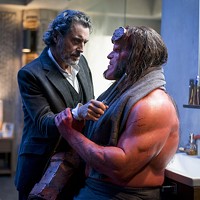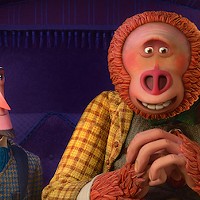

Page 2 of 4
I THINK I LOVE MY WIFE It's inconceivable that the names Eric Rohmer and Pootie Tang would ever appear in the same sentence, yet that's the result of cowriter-director-star Chris Rock making I Think I Love My Wife. The film is a remake of 1972's Chloe In the Afternoon, the sixth and final movie in philosophical French director Rohmer's "Moral Tales" series (issued by Criterion last year). Now, Rock and his Pootie Tang cohort Louis C.K. have teamed up to rework Rohmer's story into a moderately amusing but ultimately scattershot comedy about Richard Cooper, a businessman whose marriage to a schoolteacher (Gina Torres) has become so stagnant that he constantly daydreams about other women. Into his office walks Nikki Tru (Kerry Washington), a high-maintenance friend from his long-ago clubbing days. Bringing to mind the "Darling Nikki" from Prince's Purple Rain soundtrack, she tempts Richard by injecting some much-needed fun back into his life, thereby requiring him to decide whether he should cheat on his sexually frigid spouse. The level of humor is all over the map, yet while the script by Rock and C.K. offers a few salient points about the challenges posed in keeping any marriage fresh, any benefit of the doubt as to the picture's worth goes out the window upon the arrival of a dreadful conclusion that's not only poorly conceived and executed but also reverses one of the story's major conflicts with no explanation. I'm sure Rock meant well, but the next time he feels the urge to improve upon the French, he should try his hand at baguettes. **
THE LIVES OF OTHERS Pan's Labyrinth deserved to win the Best Foreign-Language Film Oscar, of course, but the Academy's selection of The Lives of Others hardly qualifies as an outrage. While it'd be easy to cynically rack up this film's victory to the fact that the organization's septuagenarians would more readily respond to a film about the good old days of the Cold War than to a fantasy yarn that would require them to use their imagination, the truth is that this German import is both emotionally and intellectually stimulating, a winning combo under any circumstances. Beginning in 1984, the story focuses on Captain Gerd Wiesler (excellent Ulrich Muhe), an interrogator for the East German secret police. Wiesler believes in the principles of the German Democratic Republic, and he dutifully agrees to monitor the activities of a prominent playwright (Sebastian Koch) suspected of traitorous activities. But after learning that the powers of the state are being abused by a high-ranking official (Thomas Thieme) who's only interested in the writer's actress girlfriend (Martina Gedeck), Wiesler begins to soften, finally allowing a ray of humanity to crack his rigid dogma. Never mind chronology: Thanks to modern cinema (especially documentaries and films made by a guy named Spielberg), the Cold War feels even more distant and buried in the past than World War II, yet here's writer-director Florian Henckel von Donnersmarck hitting a home run with a frightening drama that expertly evokes a period when spies would routinely come in from the cold. ***1/2
THE NUMBER 23 These days, a Hollywood filmmaker serving up a murder-mystery has to work overtime to slip one past dedicated movie fans. Sadly, the folks behind The Number 23 apparently didn't even work past their lunch break, given the obviousness of the end result. Jim Carrey, once again trying to break out of funnyman mode, delivers his darkest (if hardly most successful) performance to date -- he plays Walter Sparrow, a dog catcher whose brooding personality often seems at odds with his role as a devoted husband (to Virginia Madsen's Agatha) and father (to Logan Lerman's Robin). Walter comes into possession of a self-published book called The Number 23, and as he reads the story of a saxophone-playing detective named Fingerling (played in dramatizations by Carrey) and his carnal entanglements with an Italian femme fatale called Fabrizia (also Madsen), he becomes convinced that the book is about him, an especially disturbing revelation once he discovers that Fingerling commits murder. The stylish opening credits, which reveal the titular digit's connection to various tragedies in history (e.g. 9/11/2001 is 9 + 11 + 2 + 1 = 23), is the best part of the movie; after that, it's all hit-and-miss, with Carrey gamely navigating his way through a supposedly tangled tale that's ultimately as easy to unravel as two nylon stockings. **


